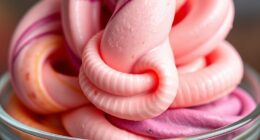If eating ice cream causes you to have diarrhea, it may be due to lactose intolerance. Dairy products such as ice cream can be difficult for some people to digest, leading to stomach upset. To prevent discomfort, consider choosing lactose-free alternatives or experimenting with dairy substitutes. Taking lactase enzyme supplements may help in controlling symptoms. Keep in mind the sugar and FODMAPs in ice cream, which could potentially cause digestive problems. Interested in learning more tips on how to avoid diarrhea while indulging in your beloved frozen desserts?
Key Takeaways
- Ice cream can cause diarrhea in lactose-intolerant individuals due to its high lactose content.
- Lactase enzyme supplements can aid in digesting lactose found in ice cream to prevent diarrhea.
- Opt for lactose-free ice cream alternatives to avoid digestive issues.
- Monitor ice cream ingredients for FODMAPs, gluten, or excessive sugars triggering diarrhea.
- Consider dairy-free sorbet or frozen yogurt as substitutes to enjoy without the risk of diarrhea.
Lactose Intolerance and Diarrhea

If you experience diarrhea after eating ice cream, it could be due to lactose intolerance. Lactose intolerance is the inability to digest lactose, a sugar found in dairy products like ice cream. When individuals with lactose intolerance consume ice cream, the undigested lactose can lead to symptoms such as gas, bloating, stomach pain, cramping, and diarrhea.
The root cause of diarrhea in lactose intolerant individuals consuming ice cream lies in the deficiency of the enzyme lactase, which is responsible for breaking down lactose in the digestive system. Without enough lactase, the lactose remains undigested, causing discomfort and diarrhea.
To avoid experiencing diarrhea after eating ice cream, it's essential to steer clear of dairy products or opt for lactose-free alternatives. By avoiding dairy, individuals with lactose intolerance can prevent the uncomfortable gastrointestinal symptoms associated with consuming ice cream and other lactose-containing foods.
Controlling Symptoms of Lactose Intolerance

To manage symptoms of lactose intolerance effectively, making dietary adjustments is essential. Here are some strategies to help you control your symptoms and improve your digestion:
- Avoiding dairy products: Eliminating or reducing dairy intake can notably reduce symptoms of lactose intolerance.
- Using lactase enzyme supplements: Taking lactase enzyme supplements before consuming dairy products can help your body digest lactose more efficiently.
- Choosing lactose-free alternatives: Opt for lactose-free milk or dairy substitutes like almond or soy milk to enjoy dairy flavors without discomfort.
- Opting for hard cheeses or yogurt with active cultures: Some dairy products are better tolerated by individuals with lactose intolerance due to lower lactose content or beneficial bacteria.
- Monitoring your symptoms: Keep track of your diet and symptoms to identify triggers and make informed choices to manage your lactose intolerance effectively.
Obtaining Sufficient Calcium

You can maintain adequate calcium intake by incorporating non-dairy sources and fortified products into your diet. Dark leafy greens and fish are excellent non-dairy sources of calcium, providing alternatives to traditional dairy products.
Calcium-fortified soy products like tofu and soy milk offer a great way to meet your calcium needs without consuming dairy. Additionally, active culture yogurt can aid in lactose digestion for those with lactose intolerance, making it a beneficial option for calcium intake.
If you're avoiding dairy altogether, consider taking Vitamin D supplements to secure proper calcium absorption and maintain bone health. Exploring dairy-free options such as almond milk and calcium-fortified juices can also help you meet your daily calcium requirements while managing lactose intolerance.
Diarrhea and Digestive Disorders

If you're experiencing diarrhea, it could be caused by various factors such as lactose intolerance, infections, medications, or underlying health issues.
Managing digestive disorders involves making dietary adjustments, taking prescribed medications, and seeking advice from a healthcare professional if symptoms persist.
Chronic diarrhea should never be brushed off, as it might indicate more serious health conditions that require prompt attention.
Diarrhea Causes
Lactose intolerance, among other factors, can lead to diarrhea by causing an inability to digest lactose commonly found in dairy products. When it comes to diarrhea causes, understanding the various triggers is essential for managing this uncomfortable issue effectively. Here are some key points to keep in mind:
- Lactose Intolerance: The inability to digest lactose in dairy products can result in diarrhea.
- Infections: Bacterial, viral, or parasitic infections can lead to acute diarrhea.
- Medications: Some medications, such as antibiotics, may cause diarrhea as a side effect.
- Underlying Health Conditions: Conditions like irritable bowel syndrome (IBS) or Crohn's disease can contribute to chronic diarrhea.
- Dietary Changes: Sudden changes in diet, especially high-fat or spicy foods, can trigger diarrhea episodes.
It's crucial to identify the root cause of diarrhea, especially if it persists, to receive appropriate treatment and prevent potential complications. Consulting a healthcare provider is advisable for a thorough evaluation and personalized management plan.
Digestive Disorder Management
Understanding how to manage digestive disorders, including diarrhea, is pivotal to improving your overall gastrointestinal health and quality of life. When dealing with diarrhea, especially due to lactose intolerance or other digestive disorders, making dietary changes and seeking guidance from a healthcare provider are vital steps towards effective management. Here are some strategies to help you navigate through digestive disorder management:
| Strategy | Description |
|---|---|
| Avoid Dairy Products | Eliminate dairy items like milk, cheese, and ice cream to reduce symptoms of diarrhea. |
| Opt for Alternatives | Choose lactose-free or dairy-free options to enjoy similar products without digestive issues. |
| Seek Professional Help | Consult a healthcare provider for proper diagnosis, treatment, and personalized dietary advice. |
| Maintain Food Journal | Keep track of your diet and symptoms to identify triggers and make informed dietary adjustments. |
| Stay Hydrated | Drink plenty of fluids to prevent dehydration, especially during episodes of diarrhea. |
Managing Digestive Disorders

To effectively manage digestive disorders, it's essential to identify triggers and make necessary dietary changes. Understanding the causes of conditions like lactose intolerance can aid in managing symptoms such as diarrhea effectively.
Here are some key strategies to help you manage digestive disorders:
- Keep a food diary to track symptoms and identify potential triggers.
- Consult a healthcare provider for proper diagnosis and personalized treatment plans.
- Experiment with elimination diets to pinpoint specific food intolerances.
- Incorporate probiotics and fiber-rich foods to support gut health and regularity.
- Stay hydrated and practice mindful eating habits to aid digestion and reduce discomfort.
Diarrhea Triggers

When it comes to triggers for diarrhea, understanding how sugar can stimulate the gut to release water, potentially causing loose bowel movements is crucial.
Additionally, lactose in dairy products can be difficult to digest for some individuals, leading to diarrhea.
It's important to watch out for FODMAPs such as fructose, artificial sweeteners, and lactose, as they're poorly digested sugars that can also prompt diarrhea.
Sugar and Diarrhea
Consuming excessive amounts of sugar can trigger diarrhea by stimulating the gut to release water and electrolytes, leading to loose bowel movements.
When it comes to sugar and its effects on your digestive system, here are some key points to take into account:
- Sugar's Impact: Excessive sugar intake can disrupt the balance of water and electrolytes in your gut, potentially resulting in diarrhea.
- Dairy Dilemma: Dairy foods containing lactose may be hard to digest for some individuals, causing gastrointestinal distress like diarrhea.
- FODMAPs Factor: Poorly digested sugars like fructose, artificial sweeteners, and lactose (found in dairy) are known triggers for diarrhea.
- Gluten Conundrum: For those sensitive to gluten, commonly found in wheat, barley, and rye, consuming it can lead to diarrhea.
- Fat Fiasco: Fried or fatty foods, if not absorbed properly by your body, can also contribute to diarrhea episodes.
Dairy Digestion Challenges
Excessive consumption of dairy products, such as ice cream, may lead to diarrhea due to difficulties in digesting lactose for some individuals. Lactose intolerance, a common condition, hinders the body's ability to break down lactose, the sugar present in dairy products like ice cream. For those with lactose intolerance, consuming ice cream can result in bloating, gas, and loose bowel movements.
In addition, ice cream containing FODMAPs, like fructose and lactose, can trigger diarrhea in sensitive individuals. This group may experience digestive discomfort after indulging in ice cream due to the presence of these fermentable carbohydrates. Despite these potential side effects, it’s important to note that not everyone will experience digestive issues from eating ice cream. Additionally, it’s worth considering that not all types of ice cream contain high levels of FODMAPs. Some individuals may be able to enjoy certain varieties of ice cream without any negative effects. However, it’s important to pay attention to how your body responds to different foods and to consume them in moderation. In conclusion, is ice cream good for you? It really depends on your individual tolerance and dietary needs.
Furthermore, for individuals with gluten sensitivity, the gluten in ice cream cones can also lead to digestive issues and diarrhea.
It's essential to be mindful of these dairy digestion challenges when enjoying ice cream. Opting for lactose-free alternatives, avoiding ice cream with high FODMAP ingredients, and choosing gluten-free cones can help prevent diarrhea triggered by dairy products.
Similarly, monitoring the intake of fried or fatty toppings on ice cream can assist in minimizing the risk of digestive disturbances.
FODMAPS and Loose Stools
FODMAPs, poorly digested sugars found in various foods, can often be a trigger for loose stools or diarrhea. When it comes to managing diarrhea triggered by FODMAPs, understanding which foods contain these sugars is essential.
Here are some vital facts to help you navigate the connection between FODMAPs and loose stools:
- FODMAPs encompass sugars like fructose and lactose that are poorly absorbed in some individuals.
- Consumption of FODMAP-rich foods, such as ice cream, can lead to diarrhea due to excess water and electrolyte release in the gut.
- Sensitivity to FODMAPs varies among individuals, with some experiencing diarrhea more frequently than others.
- Keeping track of your diet through a food journal can aid in pinpointing specific FODMAP-containing foods that may be causing diarrhea.
- Seeking guidance from a dietitian to create a tailored FODMAP-free meal plan can help alleviate diarrhea symptoms and improve gut health.
Dietary Recommendations for Diarrhea

Avoid fatty foods, dairy products, alcohol, sorbitol, and gas-producing foods like cabbage when experiencing diarrhea. Opt for bland options such as oatmeal, bananas, plain rice, and the BRAT diet (bananas, rice, applesauce, toast) to ease digestion. Remember to stay hydrated by drinking plenty of water and using oral rehydration solutions to replenish electrolytes. Herbal teas like chamomile or peppermint can also aid in hydration during diarrhea. Monitor your urine color to assess hydration levels and steer clear of sugary drinks that can exacerbate diarrhea.
| Foods to Avoid | Recommended Foods |
|---|---|
| Fatty foods | Oatmeal |
| Dairy products | Bananas |
| Alcohol | Plain rice |
| Sorbitol | BRAT diet |
Frequently Asked Questions
Why Do I Get Diarrhea Every Time I Eat Ice Cream?
You get diarrhea after eating ice cream because your body may have difficulty digesting lactose in dairy. This can lead to symptoms like bloating, gas, stomach pain, and loose bowel movements. Consider lactose-free options to avoid discomfort.
How Do You Prevent Diarrhea From Lactose?
To prevent diarrhea from lactose, you can try lactase enzyme supplements to aid digestion. Opt for dairy-free alternatives like soy or almond milk ice cream. Consulting a healthcare provider for a lactose intolerance test can confirm and guide treatment.
What Settles Your Stomach After Eating Lactose?
Feeling queasy after dairy? A lactase supplement can ease your tummy troubles. Non-dairy options like soy or almond milk might be gentler on your stomach. Remember, yogurt with active cultures can be a soothing choice too.
How to Stop Lactose Intolerance Pain Immediately?
To stop lactose intolerance pain immediately, try lactase enzyme supplements for better digestion. Avoiding dairy products with lactose and opting for lactose-free alternatives can also help manage discomfort. Stay mindful of what you consume.
Conclusion
So, next time you feel like indulging in some delicious ice cream, remember to listen to your body and make mindful choices.
Don't let a case of the runs rain on your parade! Stay informed, take care of your gut, and enjoy your frozen treats in moderation.
Remember, when it comes to avoiding diarrhea, knowledge is power. Stay informed and keep your tummy happy!
















